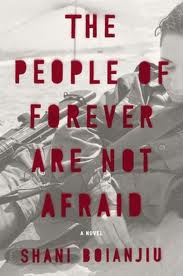Wednesday’s Work-in-Progress: Thoughts About Linked Short-Story Collections
 If you follow me on Goodreads, you know that a few days ago I finished reading Shani Boianjiu’s soon-to-be published debut novel, The People of Forever Are Not Afraid. And if you’re a member of the Jewish Book Carnival group on the Goodreads site, you may also know that one of the lingering questions I’m considering is whether anyone considered publishing this book as a collection of linked stories rather than a novel (and also, perhaps, omitting the final section, composed of two chapters which in my view are the weakest pieces in the book–but taking that discussion any further will send us on a tangent from which we are unlikely to return).
If you follow me on Goodreads, you know that a few days ago I finished reading Shani Boianjiu’s soon-to-be published debut novel, The People of Forever Are Not Afraid. And if you’re a member of the Jewish Book Carnival group on the Goodreads site, you may also know that one of the lingering questions I’m considering is whether anyone considered publishing this book as a collection of linked stories rather than a novel (and also, perhaps, omitting the final section, composed of two chapters which in my view are the weakest pieces in the book–but taking that discussion any further will send us on a tangent from which we are unlikely to return).
I wanted to love Boianjiu’s book without reservation. I’d been anticipating it since Boianjiu–recommended by Nicole Krauss–was named one of the National Book Foundation’s “5 Under 35” for 2011. I was delighted to find an excerpt included in the Publishers Lunch “BEA Buzz Books” compilation, and I quickly obtained an electronic galley (thank you, NetGalley!). Then, The New Yorker published another excerpt. And I was hooked.
And there’s so much in this book that I do admire, especially considering a) the author’s youth–it seems that she is the youngest person ever to be honored among the “5 Under 35”, and b) the fact that English is not her native language. Not to mention the complicated political issues embedded in the work and its in-the-middle-of-things perspectives on life in Israel, matters of ongoing interest to this practicing writer-who-reads.
But I hadn’t progressed all that far in the book when I realized that I was going to have trouble accepting The People of Forever Are Not Afraid as a novel. Perhaps because, as a fiction writer, I’m somewhat obsessed with these distinctions? Perhaps because recent work on one of my own stories-in-progress, which I’ve realized could easily be linked with another four or five I’ve published over the years (but not yet in book form), has given me a case of linked-stories-on-the-brain?
In the meantime, Junot Diaz has gone ahead and fueled my cerebral struggles with a Q&A for The New Yorker. A new Diaz story appears in the magazine this week (sorry–it’s paywall-protected). And in discussing this story, which appears in his forthcoming collection, This Is How You Lose Her, Diaz says: (more…)
